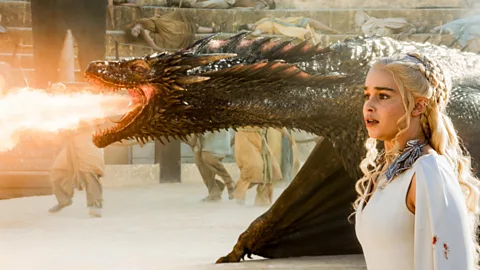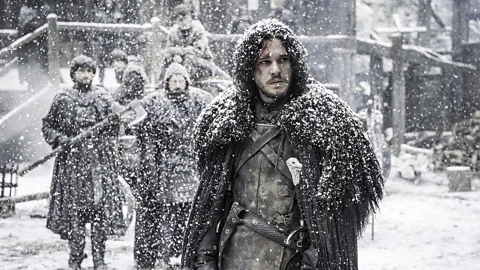Game of Thrones at 20: How the saga became a TV hit
 HBO
HBOThe fantasy epic slowly became a cultural phenomenon over two decades. Why did it face such a long road to success? Jennifer Keishin Armstrong investigates.
Even as far back as 1996, Game of Thrones was fighting its own hype.
Yes, George RR Martin’s A Game of Thrones, the book that formed the basis of the blockbuster HBO television series, came out 20 years ago this August. And yes, at the time, reviewers were griping that “as long ago as 1994”, they had been hearing about the film and TV rights bidding war over Martin’s A Song of Ice and Fire trilogy (which kicked off with A Game of Thrones, and has since become a seven-part series).
David Mathew wrote on Infinity Plus, an early science fiction and fantasy book site, “While a high advance payment is no guarantee of fine writing… it should, in a perfect world, be some indication that what is lumbering forth is a work of promise... In other words, we're talking about hype. However, hype is a marketing device with which this reviewer has no problem. Titanic was hyped: I enjoyed it anyway. Men in Black was hyped: I liked that too. But A Game of Thrones? Well...”
Game of Thrones hype may be one of the few things 1996 and 2016 have in common. The cultural landscape has evolved significantly: internet chatter about such matters has exploded well beyond the early days of Infinity Plus. Big-budget movies such as Titanic and Men in Black are no longer the centre of our cultural conversation; TV has taken over, an idea that was unthinkable back in the days of The Fresh Prince of Bel-Air, Boy Meets World and Family Matters. And most concerned feel that Game of Thrones – in its current incarnation as a television series – earns every bit of its hype.
 HBO
HBOThe book series’ long road to TV stardom seems like a kind of fate that fans should all thank the Seven Gods for: if it had immediately been made into a movie in the ‘90s – the more likely scenario for popular books at the time – it would have been hampered by time constraints and possibly watered down to avoid a restrictive R rating in the US, which would have prevented children under the age of 17 from seeing it without an accompanying adult. But it turns out to fit perfectly into our current ‘prestige television’ landscape, ruled by adult content and huge budgets. Even if that does mean Martin’s writing pace – despite the 20-year lag time – can no longer keep up with the TV series his creations inspired as season six gets ready to premiere on 24 April.
Origin story
Martin started his career as a writer with the 1976 fantasy collection A Song for Lya and Other Stories. Well-reviewed but far from a bestseller, he switched to writing for television in the 1980s, working on a Twilight Zone revival and Beauty and the Beast, starring Linda Hamilton and Ron Perlman. So it makes a certain amount of sense that his return to books with A Game of Thrones would lend itself well to television adaptation. “When I describe a scene, I see it in my head much as a director would see a shot,” he told January magazine in 2001. “I see how the light is falling and where the characters are standing – ‘blocking’ they call it in Hollywood – and I think working in Hollywood sharpened my dialog.”
